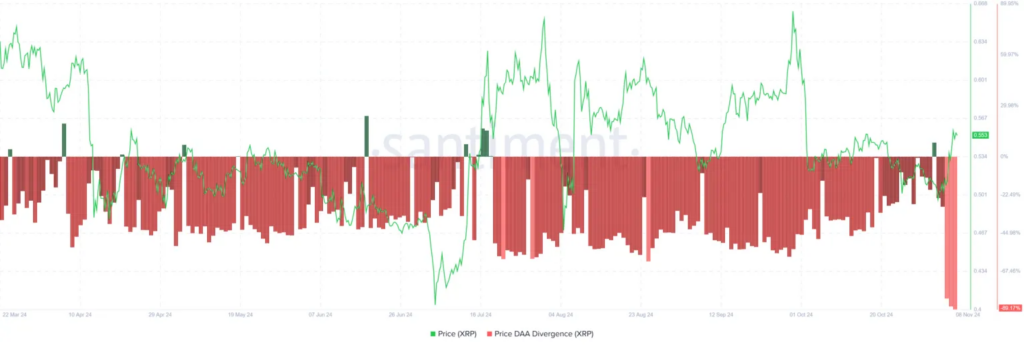- XRP struggles at $0.55 resistance level for six consecutive weeks
- Price DAA Divergence indicates declining network participation despite price gains
- 10% daily increase puts focus on 50% Fibonacci Retracement level
Ripple (XRP) technical indicators and network metrics present conflicting signals amid sustained resistance testing. Recent price action shows renewed momentum, while underlying metrics suggest potential weakness.
Should XRP investors remain cautious?
XRP on-chain data reveals concerning trends through the Price DAA Divergence indicator, suggesting diminishing network engagement despite price appreciation. This technical warning potentially signals weakening market fundamentals as fewer participants actively interact with the network during price increases.
Bitcoin’s recent achievement of consecutive all-time highs has influenced XRP’s market behavior through strengthening correlations. While this relationship currently supports price action, it potentially creates vulnerability to broader market shifts and reduces independent momentum.

Current XRP trading activity focuses on the critical $0.55 threshold, coinciding with the 50% Fibonacci Retracement level. Breaking this resistance could trigger movement toward $0.59, aligning with the 61.8% Fibonacci level and potentially confirming renewed bullish momentum.
However, market participants maintain cautious positioning as mixed signals emerge from various indicators. Support at $0.52 provides a foundation for continued consolidation while traders await clearer directional cues from both technical and fundamental factors.
The intersection of technical resistance, network metrics, and market correlations creates a complex environment for XRP’s short-term prospects. These factors suggest careful monitoring of key levels remains crucial for confirming sustained momentum or potential reversals.
Volume patterns and network engagement around these critical levels will likely determine XRP’s ability to overcome current resistance as market participants balance technical formations against declining network participation metrics.








